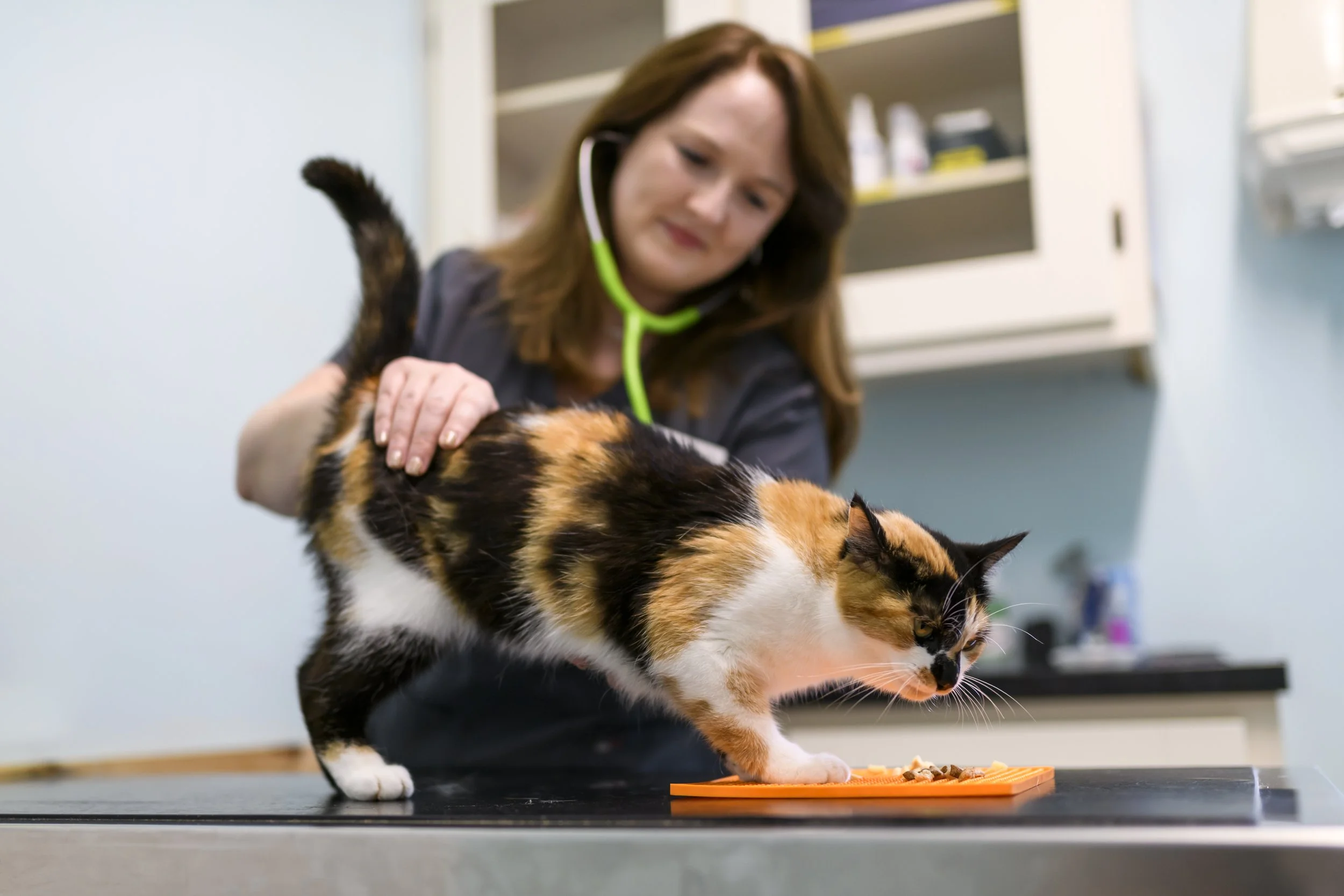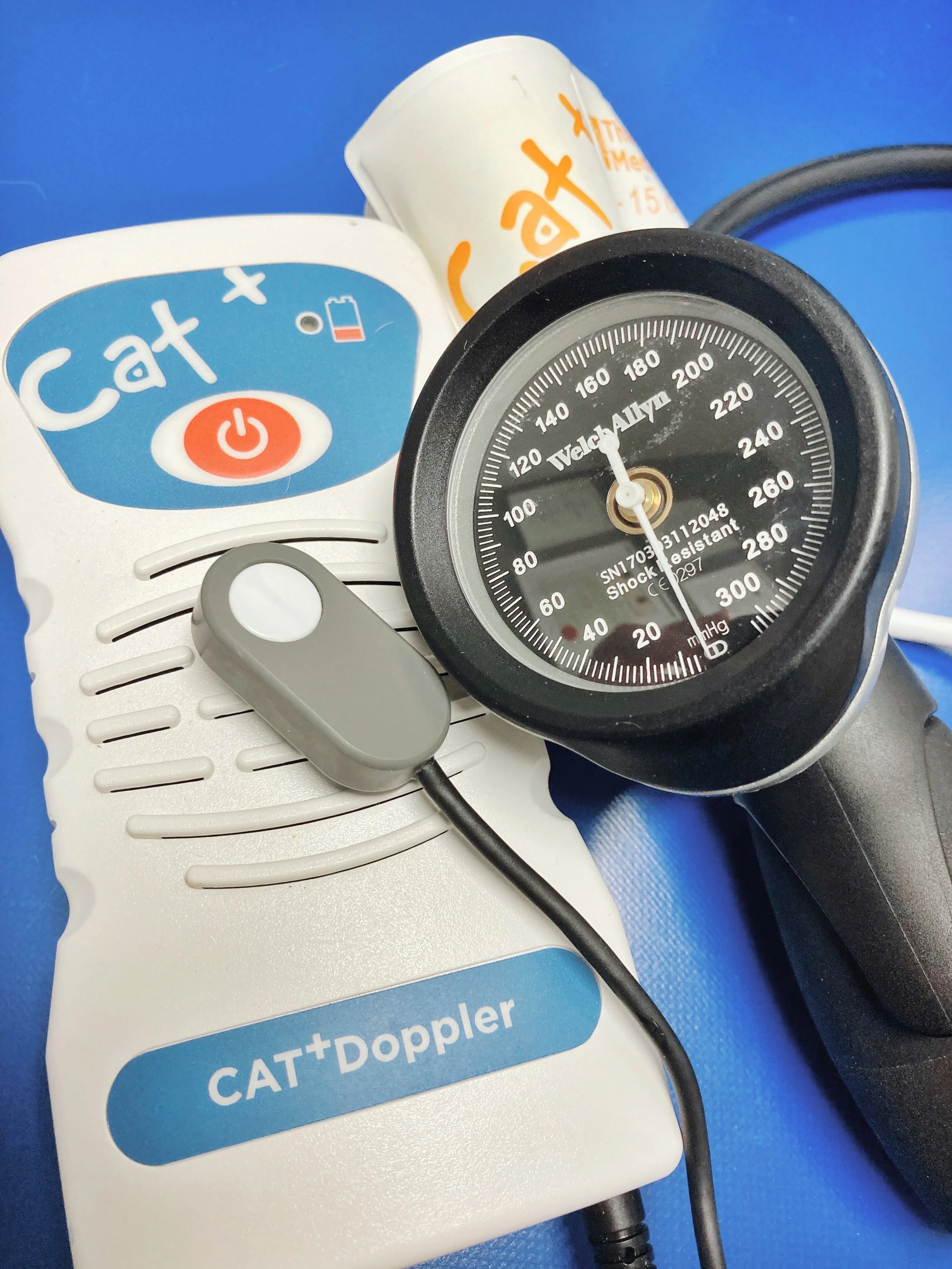Pet Cardiologist information for Owners
We understand that the possibility of your pet being diagnosed with heart condition can be worrying.
We see complex heart cases daily and are used of helping you and your pet on this journey.
Please contact your primary care vet (GP vet) to discuss referral if you would like your pet to see our experienced and caring cardiologist Jane.
Taking time to explain & discuss
Even though heart disease may be complex, we will always discuss the options and findings of diagnostic tests with you in a transparent and simple, easy to understand manner.
It is important to us that you are comfortable with the ‘ins and outs’ of your pet's condition, and we will always set aside time to discuss your pet’s diagnosis and treatment with you without any rushing.
Information to take home
We know that sometimes there is a lot to take in in these situations, so we will always provide you with a written summary of your pet’s management plan and information sheets about their condition to take home for reference later.
Working with your vet
We will work closely with your primary care (GP) vet to get the best outcome for your pet. We will send a full report of the findings of your pet’s diagnostic tests and management plan to your vet following your appointment so that they have the information they need to help and treat your pet’s heart condition on an ongoing basis.
Heart Scan (Echo)
We use a specialized cardiac ultrasound machine to examine the chambers and various structures of the heart, in addition to assessing the speed and direction of blood flow. This key test helps us to diagnose issues with the structure or pumping function of the heart.
ECG
This test tells us about the electrical system of the heart and is the key test for diagnosing irregular heartbeats. In some cases, a longer test over 24 hours might be needed to observe more infrequent irregular heartbeats and for this we use a Holter monitor, also known as a ‘backpack ECG’.
Blood Pressure
Measurement of blood pressure is important in many heart conditions. Some heart diseases can cause low blood pressure, whereas high blood pressure for other reasons can impact how we manage heart disease long term.
FAQs - Visiting the Pet Cardiologist
-
Pet owners should note that we can only make arrangements to see your pet after your vet has been in touch with us to arrange referral. Please contact your primary care vet (GP vet) to discuss referral if you would like your pet to see a cardiologist.
Once your vet has contacted us to arrange referral and sent us an up to date copy of your pet’s medical history and recent tests, we will contact you directly to arrange an appointment for your pet.
-
Your pet should prepare by fasting overnight on the night before their appointment. Please ensure that they do not have access to food from midnight the night before their appointment, and do not receive breakfast on the morning of their appointment. In very young puppies & kittens (<4 months old), we would advise that they do not fast for this length of time, and would recommend that they receive a tablespoon of their usual food at 6am on the morning of their appointment.
All pets, young or old, should have continuous access to fresh water at all times, even when fasting.
If your pet has been prescribed any medications by your vet and are due doses on the morning of their appointment, then please give their medications as you usually would. If this means that you need to give them a small morsel of food (no more than a tablespoon’s worth) to give them their tablets, then this is OK. If you pet needs medication during the day, please bring you tablets with you to your appointment and let us know when any medications are due.
-
Initial appointments are normally scheduled for the morning. On arrival, we will allow your pet to have some time to get used of the surroundings of the clinic and meet our team. You will have an appointment with our cardiologist Jane, where your pet’s symptoms (if any), everyday lifestyle and any concerns you may have will be discussed. Your pet will then be examined by the cardiologist, and a plan for any diagnostic tests discussed.
Once we have discussed and agreed the planned diagnostic steps with you, your pet will be admitted for tests on the same day. This means that your pet will stay with us for a few hours whilst the agreed tests are carried out. Whilst with us, you pet will be cared for by our cardiologist Jane, and our experienced nursing team.
Once the discussed diagnostic tests have been carried out, we will arrange a discharge appointment. This usually takes place in the early afternoon on the same day. At this discharge appointment, we will discuss and explain the results of your pet’s tests and their diagnosis (if applicable). In this discharge appointment, we will spend time explaining your pet’s condition and will show you images of their heart scan.
We will discuss what our findings mean for your pet now and in the future, including recommended treatments and prognosis.
For a few tests, such as blood tests and Holter monitoring (backpack ECG), results may take a few days to become available. If this is the case, will will contact you via phone to discuss the remaining results once they become available.
Please feel free to ask any questions about your pet’s tests and diagnosis at this appointment - there is no such thing as a silly question and we are more than happy to spend time helping you learn and understand all aspects of your pet’s condition and recommended care.
We understand that there may be a lot of information to take in at this time, so you will be supplied with an information sheet on your pet’s condition and a summary report of the key points for reference later.
-
For most cardiac diagnostic tests, in most patients, sedation is not required. For example, for a heart scan, most dogs and cats will lie happily on their side on a comfy padded table whilst having cuddles and reassurance from our nursing team whilst our cardiologist carries out the scan.
In some cases where we anticipate that your pet may be particularly anxious, sedation may be beneficial to reduce their stress levels whilst tests are carried out. If this is the case, we will discuss this fully with you beforehand.
-
Following your pet’s appointment with us, your pet will be discharged back into the care of your usual primary care (GP) vet. We will send a full report of the findings of your pet’s diagnostic tests and management plan to your vet following the appointment so that they have the information they need to help and treat your pet’s heart condition on an ongoing basis. We are happy for your vet to be in contact with us on an ongoing basis should they require advice on ongoing management of your pet’s heart condition.
In some cases we may recommend that your pet is re-referred at a later date for a progress reassessment of their heart disease. If this is the case, and you and your vet wish to go ahead with the recommended reassessment, please contact your usual vet to discuss this. We would ask that your vet forward an up to date copy of your pet’s medical history to us with their referral request.
If your pet requires ongoing heart medications, they should be obtained from your usual primary care (GP) vet on an ongoing basis.
What is a Heart Murmur?
Has your vet heard a heart murmur in your dog or cat? Are you wondering what this means?
A Heart murmur is simply the sound made by vibrations which are caused by turbulent or disorganised blood flow in the heart.
Think of a slow flowing river, when all the water flows in one direction smoothly and quietly. This is like the normal, quiet blood flow moving through the normal heart.
Now consider a loud, noisy waterfall, where water flows quickly in many different directions at the same time. This is like the turbulent blood flow within the heart which causes a murmur to be heard through your vet’s stethoscope.
Turbulent or disorganised blood flow in the heart can be caused by a number of problems, such as a leaky heart valve or an narrowing in a blood vessel leaving the heart. Diagnosis of the exact cause of a murmur requires a heart scan with ultrasound, also known as an ‘Echo’, so that the cause of the murmur can be seen and assessed by your pet’s cardiologist.





